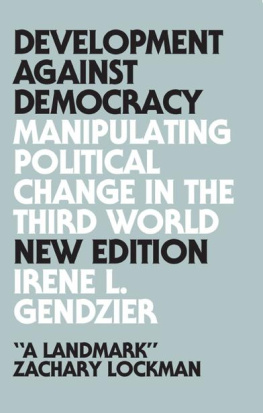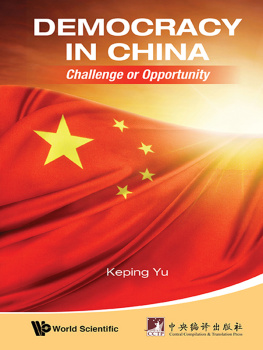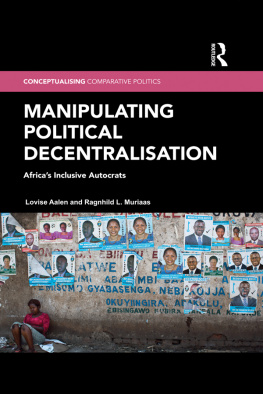Irene L. Gendzier - Development Against Democracy: Manipulating Political Change in the Third World
Here you can read online Irene L. Gendzier - Development Against Democracy: Manipulating Political Change in the Third World full text of the book (entire story) in english for free. Download pdf and epub, get meaning, cover and reviews about this ebook. year: 2017, publisher: Pluto Press, genre: Politics. Description of the work, (preface) as well as reviews are available. Best literature library LitArk.com created for fans of good reading and offers a wide selection of genres:
Romance novel
Science fiction
Adventure
Detective
Science
History
Home and family
Prose
Art
Politics
Computer
Non-fiction
Religion
Business
Children
Humor
Choose a favorite category and find really read worthwhile books. Enjoy immersion in the world of imagination, feel the emotions of the characters or learn something new for yourself, make an fascinating discovery.
- Book:Development Against Democracy: Manipulating Political Change in the Third World
- Author:
- Publisher:Pluto Press
- Genre:
- Year:2017
- Rating:5 / 5
- Favourites:Add to favourites
- Your mark:
- 100
- 1
- 2
- 3
- 4
- 5
Development Against Democracy: Manipulating Political Change in the Third World: summary, description and annotation
We offer to read an annotation, description, summary or preface (depends on what the author of the book "Development Against Democracy: Manipulating Political Change in the Third World" wrote himself). If you haven't found the necessary information about the book — write in the comments, we will try to find it.
Irene L. Gendzier: author's other books
Who wrote Development Against Democracy: Manipulating Political Change in the Third World? Find out the surname, the name of the author of the book and a list of all author's works by series.
Development Against Democracy: Manipulating Political Change in the Third World — read online for free the complete book (whole text) full work
Below is the text of the book, divided by pages. System saving the place of the last page read, allows you to conveniently read the book "Development Against Democracy: Manipulating Political Change in the Third World" online for free, without having to search again every time where you left off. Put a bookmark, and you can go to the page where you finished reading at any time.
Font size:
Interval:
Bookmark:
Development Against Democracy
Democracy
Manipulating Political Change
in the Third World
NEW EDITION
Irene L. Gendzier
Introduction by Robert Vitalis
Foreword by Thomas Ferguson

Originally published 1985 by Westview Press as Managing Political Change:
Social Scientists and the Third World
Reissued 1995 by The Tyrone Press as Development Against Democracy:
Manipulating Political Change in the Third World.
This new edition published 2017 by Pluto Press
345 Archway Road, London N6 5AA
www.plutobooks.com
Copyright Irene L. Gendzier 1985, 1995, 2017
The right of Irene L. Gendzier to be identified as the author of this work has been asserted by her in accordance with the Copyright, Designs and Patents Act 1988.
British Library Cataloguing in Publication Data
A catalogue record for this book is available from the British Library
ISBN 978 0 7453 3729 6 Hardback
ISBN 978 0 7453 3728 9 Paperback
ISBN 978 1 7868 0145 6 PDF eBook
ISBN 978 1 7868 0147 0 Kindle eBook
ISBN 978 1 7868 0146 3 EPUB eBook
This book is printed on paper suitable for recycling and made from fully managed and sustained forest sources. Logging, pulping and manufacturing processes are expected to conform to the environmental standards of the country of origin.
Typeset by Stanford DTP Services, Northampton, England
Simultaneously printed in the United Kingdom and United States of America
I am grateful to Pluto Press and to David Shulman, Commissioning Editor, whose editorial guidance and support have been unique in my experience. His continuing interest in this project over an extended period of time, made its reprinting possible.
The critical responses offered by anonymous readers made a difference. So did the support of friends and colleagues, including Thomas Ferguson, Zachary Lockman and Robert Vitalis, and Nathan Citino, whose works on the political economy of oil, money and power, Middle East studies and International Relations, have long been sources of inspiration, as was the work of the late Marilyn Young, who was among the first to encourage me to reprint Development Against Democracy, so that her students could finally find a copy of it. Noam Chomsky, provided judicious criticisms of an earlier edition, and was enthusiastic about its reprinting. And finally, I am grateful to my husband, Assaf Kfoury, whose steadfast support was an indispensable element in the completion of this and many other projects.
Irene Gendzier and Pluto Press are to be congratulated for many reasons, but the most compelling is probably their exquisite timing. As this updated reissue of her classic appears, the Trump administration is bringing out a new edition of its own: a rerun of U.S. foreign policys past heedless embraces of authoritarian regimes, penchant for secrecy, and reckless overconfidence in the power of military force.
The sometimes disorienting mix of muscular rhetoric, deliberate efforts to look unpredictable, and almost casual talk of boots on the ground, bombings, and the need for new strategic poses is eerily familiar to analysts who lived through the period Dr. Gendzier writes about with such nuance and verve. I certainly remember the department spaces I was enjoined from entering as a young assistant professor at MIT, for want of the requisite security clearances, even as many authors Dr. Gendzier discusses here repaired to them to work, study, or visit. But younger scholars and a new generation of Americans who never experienced the Cold War mostly do not know this history. They are mostly unaware of the close interactions between many major works of Comparative Politics, International Relations, and American foreign policy or the intense coordination among many protagonists with all manner of government and major foundation personnel. They have little or no conception of how thoroughly broad psychological themes pushed out serious discussion of political institutions and economic analysis.
Researchers working on this period report that documents once available have disappeared, even as some new archival materials open up. Irene Gendziers splendid book is not the last word on its subject, but it is indispensable for anyone trying to understand how theory and reality related to each other then (and since). One might doubt whether understanding this past will be enough by itself to prevent us from making the famous second move from tragedy to farcethe basis of American economic and political power is so much shallower now than in the age of High Cold War.
Development Against Democracy remains, alas, startlingly contemporary. Many of the doctrines it discusses live on in second or third generation versions whose deep structures are only occasionally apprehended. The ease with which these constructions combine with ideology and poor empirical methods to become instrumentalized is breathtaking; Irene Gendziers fine study merits a wide readership from a new generation of readers.
Thomas Ferguson is Professor Emeritus at the University of Massachusetts, Boston.
Thirty-five years ago, on June 6, 1982, Israeli forces invaded and occupied southern Lebanon. Its army and air force laid siege to the capital, Beirut, with the objectives of destroying the Palestinian Liberation Organization, then headquartered there, and installing its Maronite Christian clients in power. I had returned to the United States that summer, where I was a PhD candidate in political science at the Massachusetts Institute of Technology, specializing in the political development of the Middle East, and had taken a two-year leave of absence in Cairo. Through friends in Cambridge, I made contact with a small group of mostly academic activists that had constituted themselves as the Ad Hoc Emergency Committee on Lebanon and as a result found myself handing out leaflets to subway commuters one September evening at the Harvard T Station with one of the committees founders, Boston University professor Irene Gendzier.
I didnt know it then, but, Gendzier had been considered a rising star in the relatively small U.S. Middle East studies field, back in the 1960s. A historian with a Columbia University PhD, she taught in BUs history and political science departments. Her first book, a scholarly monograph published in 1966 and based on her dissertation, was a critically acclaimed biography of the exiled nineteenth-century Jewish-Egyptian nationalist writer, Yaqub Sanua. She wrote on Arab-Israeli affairs, on Palestine-Israel, in her ahead-of-its-time formulation, and on North Africa for the private, Washington, DC-based Middle East Institutes house organ, the Middle East Journal, which served as the main professional outlet prior to the founding of the Middle East Studies Association in 1966. Gendzier was elected to MESAs board of directors in 1974, but by then her profile and research program had changed, like many others affected by the U.S. wars in Southeast Asia, and she soon resigned in protest of the associations ties to the Central Intelligence Agency and other parts of the national security state.
She published her next two books with trade rather than university presses. A Middle East Reader (1969), an edited volume for which Gendzier supplied a critical introductory essay, provided non-specialists with an understanding of regional developments following Israels defeat of Egypt and Syria in June 1967 and its takeover of the whole of Jerusalem, the West Bank, and Gaza. In 1973 Pantheon published her path-breaking
Next pageFont size:
Interval:
Bookmark:
Similar books «Development Against Democracy: Manipulating Political Change in the Third World»
Look at similar books to Development Against Democracy: Manipulating Political Change in the Third World. We have selected literature similar in name and meaning in the hope of providing readers with more options to find new, interesting, not yet read works.
Discussion, reviews of the book Development Against Democracy: Manipulating Political Change in the Third World and just readers' own opinions. Leave your comments, write what you think about the work, its meaning or the main characters. Specify what exactly you liked and what you didn't like, and why you think so.







